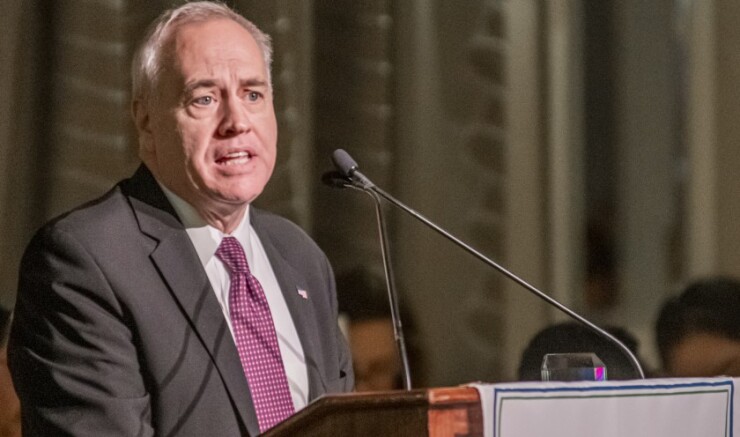As House Democrats and Senate Republicans negotiate another round of coronavirus financial aid, experts and state and local officials are making the case that only the federal government is capable of preventing a serious long-term struggle for municipalities.
That was a major theme to emerge Wednesday during a webinar hosted by the Volcker Alliance and the University of Pennsylvania’s Institute for Urban Research. They broadly agreed states and localities are headed for deep tax revenue holes without additional and substantial federal aid, and most local governments are not equipped to help themselves.
“I worry about their ability to maintain essential public infrastructure,” former New York Lieutenant Gov. Richard Ravitch said of local governments, noting that many localities already struggled with pension obligations and infrastructure underinvestment prior to the devastating economic effect of the coronavirus outbreak.

Senate Republicans revealed this week their plan for another round of coronavirus aid that was
The Republican proposal is also far from the much-larger $3.5 trillion proposal already put forth by House Democrats.
“It’s going to be a real stretch without further federal aid,” said William Glasgall, senior vice president and director of state and local initiatives, at the Volcker Alliance.
Glasgall said localities would have trouble borrowing without additional support, although he said the help provided by the Federal Reserve programs to support money market funds and to purchase certain muni debt.
“No matter how much they borrow, they’re going to have to pay it back some time,” Glasgall said.
Michael Nutter, the former mayor of Philadelphia who led the city from 2007-2011, said his experiences during the Great Recession showed him it was very difficult for a locality to cut its way out of a serious multiyear budget gap.
“There’s only so much you can do,” he said.
Steven Kreisberg of the American Federation of State, County and Municipal Employees, said there is a split between GOP senators who feel they have to do something, and others who are fundamentally opposed to massive deficit spending.
State and local governments are generally barred by statute from deficit spending, Kreisberg said, meaning that only the federal government has the resources to make sure an already bad financial situation doesn’t become worse.
“Now is the time to run those deficits,” Kreisberg said.
New York State Comptroller Thomas DiNapoli, who has repeatedly warned of the serious impact of the coronavirus on the Empire State’s finances, declared that New York needs help with its budget shortfall and not simply the coronavirus expenses reimbursement it has received so far. New York has gotten some $7.6 billion of aid from existing federal measures, DiNapoli said, but New York has already said it is facing a fiscal 2021 budget shortfall of nearly twice that.
And most New York localities have received little federal financial help, DiNapoli said.
“We need that additional help from the federal government,” said DiNapoli.
Marcia Van Wagener, a vice president and senior credit officer at Moody’s Investors Service, said localities will continue to become more leveraged without more federal help. While previously enacted federal aid is likely to show some positive effects through the summer in the form of increased sales tax collections, she said, there was a likelihood of a lasting “austerity regime” under which state governments would push much of the burden downward onto local governments.
While Moody’s hasn’t projected a sweeping worst-case scenario projection, Van Wagner said, the agency recognizes “the longer and deeper the recession goes, the worse things will be.”





